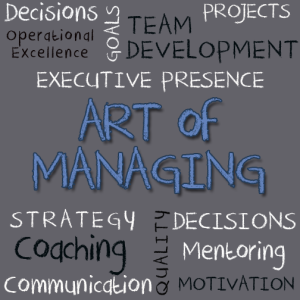 The Art of Managing series is dedicated to exploring the critical issues we face in guiding our firms and teams to success in today’s volatile world.
The Art of Managing series is dedicated to exploring the critical issues we face in guiding our firms and teams to success in today’s volatile world.
—
For some reason, the work of management and of managers often is positioned as a poor second cousin to the richer, nobler tasks of leading. Managing isn’t as captivating to many…sounding and feeling more clerical than inspirational and achievement oriented. Even the label of “manager” tends to connote someone of lesser rank toiling away over spreadsheets and far removed from the loftier issues of leaders.
The academic world and the world of business writers (and leadership bloggers!) have often worked to focus on the differences between leaders and managers. Kotter started this dialog, management texts explore the concept and it’s not uncommon for the dialog to become a debate. In my view, it’s a ridiculous non-debate. Do you really want to work for a leader who cannot manage and a manager who cannot lead?
Yes, leading is critically important. It’s also a tool of management and managing (planning, organizing, leading and controlling) and while those we label as leaders may dream and speak of building great monuments and testaments to the human spirit and ingenuity, those we call managers bring these visions to life.
The Proper View on Management and the Need to Reinvent:
Gary Hamel, founder of the Management Innovation Exchange (MIX) and a professor at the London School of Business, describes management as, “the technology of human achievement.” (Note from Art: check out Gary’s fabulous video on this topic at the MIX site.)
Hamel also suggests that the present tools of management are steeped in thinking cultivated from the industrial revolution and early 20th century thinking and fundamentally not appropriate for our emerging world. This goes for how we lead as well. He offers: Current management practices emphasize control, discipline and efficiency above all else — and that’s a problem. To thrive in the 21st century, organizations must be adaptable, innovative, inspiring and socially accountable. That will require a genuine revolution in management principles and practices.
If Hamel is right, the work of today’s manager includes both flying the current plane and building a new one simultaneously.
The Critical Work of Today’s Effective Manager:
The effective manager understands her business and how her firm makes money with clarity, and her decisions are guided by this knowledge. She is well versed in strategy, constantly aware of environmental forces impacting the business and critically attuned to forming a work environment that allows her people to operate at their creative best. She provides frank feedback, knocks down barriers for her team and navigates the firm’s political environment and senior leaders with the agility of a world-class athlete. She finds and develops talent, translates corporate goals into specific functional objectives and works to constantly gauge progress and quality and identify opportunities to improve performance.
And while she’s at it, as Hamel suggests, the effective manager is looking for new ways to create an advantage by changing and innovating her practices. Consider just two key issues faced by today’s managers:
1. How to cultivate effective project teams (we live in a world of projects) with team members distributed across continents and cultures.
2. How to combat and outflank fast emerging competitors armed with technologies that were pipe dreams just a few years ago and now threaten a firm’s very existence. From external awareness to command of strategy to managing the process of turning ideas into offerings, this is critical, hard work indeed.
The Bottom-Line for Now:
The work of the effective manager builds bridges, moves mountains and brings great big dreams to life. Perhaps the world and our firms need a few more people proud of their role as managers.
—
Don’t miss the next Leadership Caffeine-Newsletter! Register here
For more ideas on professional development-one sound bite at a time, check out: Leadership Caffeine-Ideas to Energize Your Professional Development.
New to leading or responsible for first time leaders on your team? Subscribe to Art’s New Leader’s e-News.
An ideal book for anyone starting out in leadership: Practical Lessons in Leadership by Art Petty and Rich Petro.
